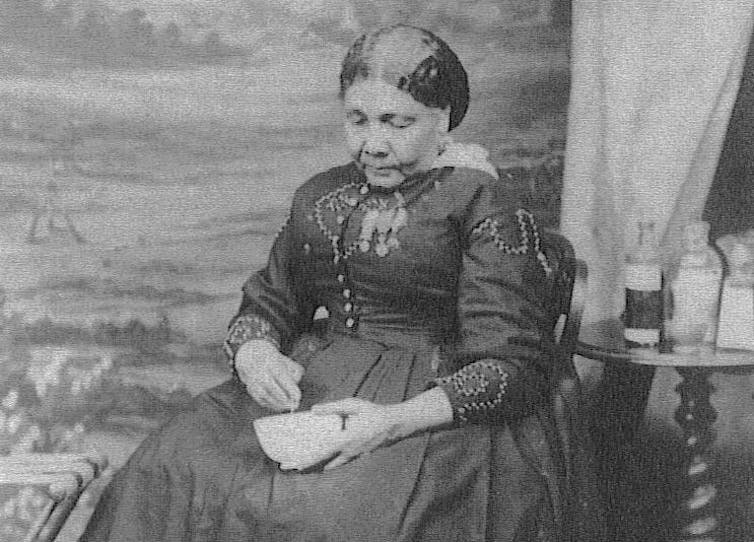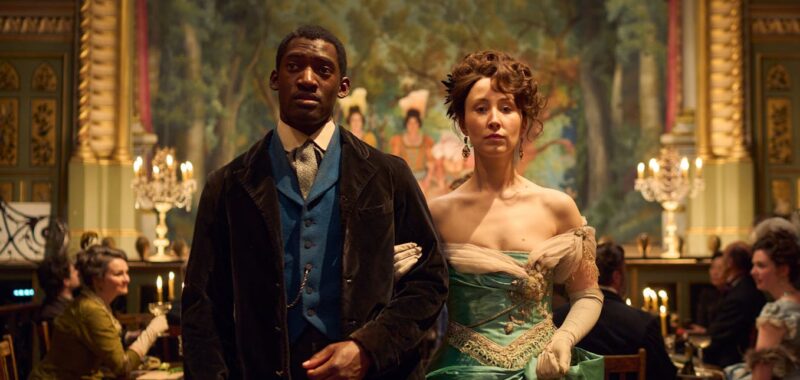In the Disney+ television series, A Thousand Blows, Malachi Kirby plays Hezekiah Moscow, a Jamaican immigrant in London who is part of an underground boxing ring in the 1880s.
The character, like many in the show, is based on a real-life figure. However, as historian David Olusoga recently explained in a comment to the Radio Times, Moscow is typical of many people who have come from the Caribbean or Africa in that we only have a fractured biography in the British historical records. We get flashes of information before he disappears.
In recent years, there have been increasing creative efforts to fill these historical gaps. This suggests there is a willingness, at least in some spheres, to acknowledge the long history of multiculturalism in Britain and to see people of colour in 19th-century histories (see also 2019’s David Copperfield starring Dev Patel and the multicultural cast of Bridgerton).
These costume dramas build on decades of scholarly work. There are now many excellent historical studies that document the various ways in which the Atlantic slave trade and imperialism produced routes and reasons for travel to Britain.
Most people who arrived here from the colonies in the 18th and 19th centuries did not have the means to write their own stories, so we glance their lives through incomplete historical records. But, there were also British subjects of colour who were educated in English with a degree of relative privilege and who produced compelling and popular accounts of their experiences in Britain or life in the colonies. They also wrote fascinating fiction and beautiful poetry.
These narratives directly challenge the general perception that multiculturalism emerged in Britain after the Windrush (Caribbean immigrants who arrived in Britain after the second world war to rebuild the nation) and that 19th-century English literature emerged only from Britain. Yet, there remains an unwillingness to centre these stories and to allow diverse voices to speak for themselves.
My own work on the AHRC-funded Victorian Diversities Research Network seeks to recuperate and promote these stories.

Looking for something good? Cut through the noise with a carefully curated selection of the latest releases, live events and exhibitions, straight to your inbox every fortnight, on Fridays. Sign up here.
Historical writers of colour and writers from other marginalised communities are continually excluded from school curricula, literary anthologies and TV adaptations. This is a kind of cultural gate-keeping that reinforces imperialist ideas about literary value.
One example of this literary exclusion is Mary Seacole (1805-1881). Born in Jamaica to a Creole mother and Scottish father, she is now remembered in Britain for her contributions to nursing during the Crimean War. She is commemorated for her work by a statue at St. Thomas’ Hospital in London and by John Aagard’s wonderful poem Checking Out Me History (2019).
Even so, there is a notable neglect of her fantastic memoir. Published in 1857, Wonderful Adventures of Mrs. Seacole in Many Lands is a funny, insightful and interesting account of her fulsome life. It clearly shows an affinity for Britain, while also acknowledging the difficulties she experienced there.

Wiki Commons
Another example is Ham Mukasa (1870-1956), who penned an account of his travels to England as part of an official African delegation in 1902 titled Uganda’s Katikiro in England. Written in a light and lively manner, his travelogue offers a fascinating picture of London at the turn of the century, as seen from a unique perspective.
When Mukasa visited the British Museum not long after arriving in the metropolis, he admired the displays of “wonderful things of long ago”. He explains to his readers that these items are stored behind glass so visitors cannot touch them. It’s a fact that becomes particularly pertinent when he comes across several Ugandan artefacts donated to the museum by British travellers:
We saw different articles from our country; some had been brought by Sir H. H. Johnston, who had given a great many things, and others by other Englishmen … the Rev. R. P. Ashe had given a great many, and others too had given things from our country of Uganda.
It is a powerful image: the Ugandan men standing in a British institution looking at their own indigenous culture through a glass. The encounter speaks directly to contemporary debates about museum collections and the need for inclusive cultural spaces.
Both Mukasa and Seacole, as people of colour and colonial subjects, articulate feelings of belonging and unbelonging in the metropolitan centre. They find much to admire in British culture and society while also acknowledging the fact of racial marginalisation.
As such, they give historical and literary expression to the affects of mobility, migration and multiculturalism. As professor of global literatures Ruvani Ranasinha argues, current debates on citizenship rights, migration policy, what constitutes “Englishness” and multiculturalism were prompted and anticipated by the presence of colonial subjects within Britain over a century ago.

National Gallery of Canada
In a 2019 paper, he explains that “Britain was always ‘multicultural’ even before multiculturalism was theorised: multicultural in terms of a sense of (un)belonging, a redrawing of culturally and racially defined borders and remapping of British identities”. And so, Ranashina notes, we must do more than simply acknowledge the historical presence of marginalised people and start engaging with diverse cultural contributions.
This is vital because an inclusive canon more accurately represents the multiple stories that make up English literary history.
It also makes important critical and cultural contributions to the creation of an inclusive society today. This is acknowledged by actor and writer Paterson Joseph who recently fictionalised the letters of Ignatius Sancho, a writer and composer, who was born on a slave ship crossing the Atlantic Ocean:
“I was once timid about my place here in the UK, but researching Sancho’s story … has given me a deep sense of belonging, of a shared history with a nation that sometimes ignores, sometimes rejects, my people’s right to an equal role in its storytelling.”

